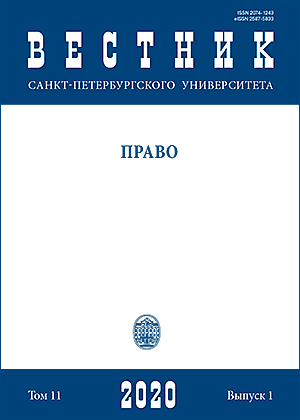Artificial intelligence in the system of electronic justice by consideration of corporate disputes
DOI:
https://doi.org/10.21638/spbu14.2020.102Abstract
Trends in the development of modern public relations illustrate a desire to use artificial intelligence in the field of electronic justice. The developed ideas of technological aspects in the work of artificial intelligence do not add up in terms of justice for both domestic and foreign jurists. The unpreparedness of a legislator to define a legal regime of work for artificial intelligence is caused by lack of experience in its use. Implementation of artificial intelligence in the activities of society will show the merits and demerits only after some time. Under the specified circumstances, forecasting the prospects of development for mechanisms of legal regulation in the work of machine intelligence is represented very conditionally. In the present article, possible ways and legal consequences for the implementation of artificial intelligence in the system of electronic justice in Russia on the example of corporate disputes are investigated. The chosen category of disputes is not accidental. By considering corporate disputes, artificial intelligence will allow courts to quickly and authentically establish the essential facts of the case, to check arguments of participants in the process and, as a result, it is essential to reduce the time of acceptance of the objective decision. In corporate relations often an assessment is required of the conscientiousness behavior of participants regardless of the emotional and psychological factors, in particular influencing the work of the judge-person. The understanding of artificial intelligence as a digital program on the basis of its programmers of mathematical algorithms, developing “new” solutions (machine thinking), demands research of algorithms of its work in court, including in terms of optimization of trial and the purpose for establishment of the truth in business. In the work, two scopes of artificial intelligence in court are divided by consideration of corporate disputes: office-work and the general judicial proceedings; assessment of proofs and establishment of legally significant circumstances in a corporate dispute.
Keywords:
court, legal proceedings, artificial intelligence, electronic justice, corporate disputes, electronic proofs, legal proceedings language, digital protocol, judicial cloud, large deals
Downloads
References
Downloads
Published
How to Cite
Issue
Section
License
Articles of "Vestnik of Saint Petersburg University. Law" are open access distributed under the terms of the License Agreement with Saint Petersburg State University, which permits to the authors unrestricted distribution and self-archiving free of charge.






